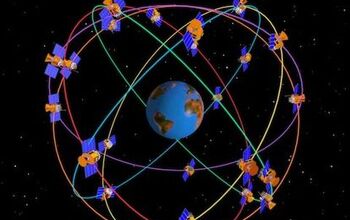Wisconsin Supreme Court Upholds GPS Spying With Warrant
Wisconsin’s highest court yesterday approved police use of Global Positioning System (GPS) devices to track motorists, as long as a valid search warrant is obtained. In 2003, Madison Police Detective Mary Ricksecker attached a tracking device to the 1980 Chevy Beretta as it sat on the private driveway belonging to Michael A. Sveum, then age 35. Sveum was suspected of stalking his ex-girlfriend, Jamie Johnson based on nine hang-up calls that were placed at payphones around the city. The tracking device was eventually used to connect Sveum to the time and place of other calls.
Sveum argued that this method of tracking was illegal because the Fourth Amendment protected him against unreasonable searches. The state countered that police are free to attach a GPS device to track a vehicle on public roads because the same information would have been available to any human officers stationed to observe the streets. As this was the prosecution’s only argument, the court of appeals last year upheld the use of GPS without a warrant ( view opinion). The supreme court took a different view, and considered whether the warrant that a judge issued in Sveum’s case was valid.
“We exercise our discretion to reach this issue, rather than deem it waived,” Justice Patience Drake Roggensack wrote for the majority. “We conclude that the order authorizing the installation and monitoring of a GPS tracking device on Sveum’s vehicle was a valid search warrant under the Fourth Amendment. First, the order was signed by a neutral and detached magistrate. Second, Ricksecker’s affidavit provided probable cause… Finally, the order particularly described the object into which the GPS was to be placed, i.e., Sveum’s vehicle; the circumstances that led agents to seek to install the GPS, i.e., evidence of Sveum’s stalking activities; and the length of time for which GPS surveillance was requested, i.e., no more than 60 days.”
The court dodged the question of whether warrantless spying was allowed.
“We elect not to resolve the first issue, and assume, without deciding, that a search or seizure occurred in this case that required authorization by a warrant,” Roggensack wrote.
Justice N. Patrick Crooks feared the majority decision could undermine constitutional protections.
“Given the increased prevalence of GPS devices used in day-to-day activities and the speed with which technological advances expand the ability and ways in which a person or object can be tracked, I believe that expanding this holding to other uses or other devices could have the potential to weaken protections guaranteed by the Fourth Amendment…” Crooks wrote.
Several Justices called on the legislature to impose limits on how GPS systems might be used.
“The myriad of technical, legal and policy issues involved in electronic surveillance lend themselves to legislative resolution, not ad hoc judicial authorizations or a bewilderingly complex judicial attempt to shoehorn the possibilities of new surveillance technologies into the parameters of statutes that were never meant to accommodate them,” Justice Shirley S. Abrahamson wrote in a dissenting opinion.
A copy of the decision is available in a PDF file at the source link below.
Wisconsin v. Sveum (Supreme Court, State of Wisconsin, 7/21/2010)
[Courtesy: Thenewspaper.com]
More by The Newspaper
Latest Car Reviews
Read moreLatest Product Reviews
Read moreRecent Comments
- Redapple2 jeffbut they dont want to ... their pick up is 4th behind ford/ram, Toyota. GM has the Best engineers in the world. More truck profit than the other 3. Silverado + Sierra+ Tahoe + Yukon sales = 2x ford total @ $15,000 profit per. Tons o $ to invest in the BEST truck. No. They make crap. Garbage. Evil gm Vampire
- Rishabh Ive actually seen the one unit you mentioned, driving around in gurugram once. And thats why i got curious to know more about how many they sold. Seems like i saw the only one!
- Amy I owned this exact car from 16 until 19 (1990 to 1993) I miss this car immensely and am on the search to own it again, although it looks like my search may be in vane. It was affectionatly dubbed, " The Dragon Wagon," and hauled many a teenager around the city of Charlotte, NC. For me, it was dependable and trustworthy. I was able to do much of the maintenance myself until I was struck by lightning and a month later the battery exploded. My parents did have the entire electrical system redone and he was back to new. I hope to find one in the near future and make it my every day driver. I'm a dreamer.
- Jeff Overall I prefer the 59 GM cars to the 58s because of less chrome but I have a new appreciation of the 58 Cadillac Eldorados after reading this series. I use to not like the 58 Eldorados but I now don't mind them. Overall I prefer the 55-57s GMs over most of the 58-60s GMs. For the most part I like the 61 GMs. Chryslers I like the 57 and 58s. Fords I liked the 55 thru 57s but the 58s and 59s not as much with the exception of Mercury which I for the most part like all those. As the 60s progressed the tail fins started to go away and the amount of chrome was reduced. More understated.
- Theflyersfan Nissan could have the best auto lineup of any carmaker (they don't), but until they improve one major issue, the best cars out there won't matter. That is the dealership experience. Year after year in multiple customer service surveys from groups like JD Power and CR, Nissan frequency scrapes the bottom. Personally, I really like the never seen new Z, but after having several truly awful Nissan dealer experiences, my shadow will never darken a Nissan showroom. I'm painting with broad strokes here, but maybe it is so ingrained in their culture to try to take advantage of people who might not be savvy enough in the buying experience that they by default treat everyone like idiots and saps. All of this has to be frustrating to Nissan HQ as they are improving their lineup but their dealers drag them down.


































Comments
Join the conversation
I'm disturbed by the fact that, rather than arguing that the warrant gave them the right to install the GPS, the state claimed the right to track anyone (and hence everyone) via GPS. The court made the correct call in this case. Trusting the legislature to get this right is scary, but I don't see another option.
As long as a warrant is involved, this isn't much of a problem. However... “The myriad of technical, legal and policy issues involved in electronic surveillance lend themselves to legislative resolution, not ad hoc judicial authorizations or a bewilderingly complex judicial attempt to shoehorn the possibilities of new surveillance technologies into the parameters of statutes that were never meant to accommodate them,” Justice Shirley S. Abrahamson wrote in a dissenting opinion. There IS a need for legislative guidance here - if for no other reason than to reassure the public. Long term storage and security of digital search records should be discussed - especially when it comes to video surveillance where there's no prosecution. Corruption or modification of electronic records could really turn the public off on this.